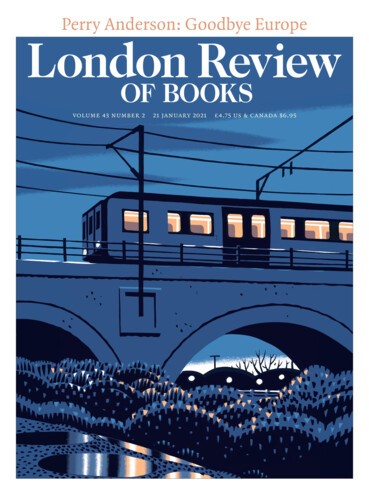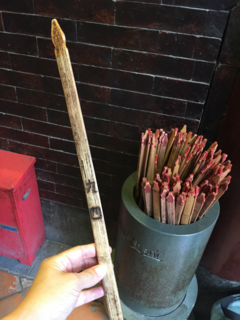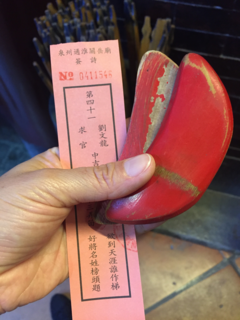On the evening of the fifteenth day of the seventh month, according to the Chinese lunar calendar, the gates of hell open, disgorging spirits to roam the earth for one night. It’s celebrated as the Zhongyuan (‘Hungry Ghost’) Festival. Last year hell had more inhabitants than usual, as was evident from the many small fires burning on the pavement of Zhuankou Street in Wuhan. The fires, lit in the places believed to be most convenient for ghosts, were closely packed in small rows on street corners. Families drew white chalk circles on the ground, sketching a chimney as an exit pointing southwest, and burned fake paper money inside the circles. They hoped their ancestors, and the newly deceased, would receive the gifts they presented: money, biscuits, fruit, cigarettes, alcohol. Ghosts whose families make offerings have a chance to find their way home, but after 11 p.m., when the fires have died out and the streets are deserted, the homeless ghosts start to wander, hungry for food. Last year, or so those who left offerings believed, many were victims of Covid-19.
China has been extremely effective at controlling the spread of the virus. There has been no second wave, and there were no surges until the end of 2020. A very small number of cases continue to be identified in port and border cities, but almost all are imported. Outbreaks are controlled by mass testing (three million people in three days in the city of Tianjin) and the reimposition of travel restrictions. Except for those living in areas under lockdown, people travel freely, as long as they wear a mask on public transport and display a green health code on their phone when they enter a public building.
This success has come at a price, however. Most of us know someone who has lost their livelihood because of the draconian policies enacted to reduce social contact. The failure rate of businesses has been so high that the GPS map service provided by Baidu (the Chinese equivalent of Google) is no longer accurate. If you visit a shop or company you’ve seen online, you’ll probably find a locked gate or a new business already operating there. Many businesses are now recovering, and new jobs are emerging, but the damage to our domestic lives has been profound.
Before the pandemic, most people had never spent 24 hours together in the same apartment with the rest of their family, let alone several months. During the lockdown husbands attacked wives, parents assaulted children, children rebelled, in-laws quarrelled. One woman walked thirty miles with her children to her parents’ home in order to escape her violent husband. The police, overwhelmed by the demands of quarantine surveillance and anti-virus measures, tried to mediate disputes by phone. Their interventions rarely succeeded. When the seventeen marriage registration offices in Xi’an city resumed work, divorce applications were immediately booked for an entire month (there was less interest in marriage certificates). The same happened in Shanghai, Shenzhen and other cities. No one knows how many fights, divorces and suicides can be attributed to the consequences of Covid-19, and no one knows what to do to repair the damage it has caused.
For those who are affiliated to work units in Communist Party branches, there has been some institutional support. No one can accuse the party of being thoughtless when it comes to the well-being of its members. But what happened during the pandemic damaged public trust in the party leadership. Since China is now controlling the spread of infection more effectively than Europe or the United States, the CCP is making every effort to claim this as a success of the socialist system, and to nurture pride in being Chinese and belonging to the party.
Three weeks ago, the secretary of our branch shared a link to a video lecture in our WeChat group: ‘Dear party members, here is the twelfth party class of the year. Please watch it and hand in your viewing record by the end of the week.’ The two-hour lecture was entitled: ‘Thoughts on the Covid-19 Epidemic – How the “Four Confidences” consolidate China’s Power.’ (The pillars of the ‘complete conceptual system of socialism with Chinese characteristics’ described by President Xi Jinping in 2016 are confidence in its path, its theory, its system and its culture.) The lecturer used phrases familiar from the media, that the pandemic ‘is a big test for all countries’, and that compared to other governments, ‘China handed in the best answer sheet.’ In order to use up the allotted time, he spoke slowly, taking a breath every two or three words.
At one point, describing the effects of the virus on populations worldwide, he said: ‘The pandemic influences all Chinese and global … uh.’ He paused, alerted by his training to a possible trap. He didn’t want to call American politicians ‘people’. In China, the Party represents the people’s fundamental interests, therefore the Party and the people are one. By contrast, the US government ignores the well-being of its citizens. He couldn’t think of another word, so he tried again: ‘Uh … all Chinese and the globe.’
To prove that we have watched the lecture we have to take a picture of ourselves looking at the screen or send a screenshot of the last minute of the video. Like many others I scrolled to the end, took a picture and went back to what I was doing before. The video, and other online materials, are part of a broader campaign to reassert the Party’s authority and to illustrate the failures of Western democracies. Considerable effort has been put into developing online platforms, such as the 学习强国 (‘Learn and Make the Country Stronger’) app, credited to the CCP’s central propaganda department. Soon after its launch the app had ‘tens of millions’ of active users, hardly surprising since it’s compulsory for ninety million party members and for those working in government institutions (points earned from clicks and time spent on the app are part of performance evaluations). The app provides access to documentaries about China’s Covid-19 success, including features on party doctors, nurses and volunteers who worked on the hospital front lines. It also offers tips from psychologists on ways to improve your mental state and mood during the crisis, as well as lectures on classical music and modern art appreciation, calligraphy and Chinese paintings. But when we close the app, the consequences of the pandemic remain. Many Chinese people have turned to older belief systems than Marxism for consolation.
Religious belief isn’t openly discussed in the media. The Communist Party forbade superstitious customs after taking power in 1949: the only belief that party members are allowed to hold is that full communism will one day become a reality. We don’t know how it will be achieved, but we vow to ‘devote our entire lives to communism, to be ready to sacrifice everything for the party and the people at any time’. The party frequently calls on its members to 不忘初心 (‘remember your original aspiration’) and every so often asks us to renew our allegiance. China is far from secular, however. A survey conducted in 2007 estimated that 141 million people believe in the God of Fortune; 145 million in Feng Shui; and 362 million had seen a fortune teller in the previous twelve months.
I am an atheist, but I recently went to a Daoist temple in Quanzhou, a city on the south-east coast that was once China’s biggest port, visited by Marco Polo when it was known as Zayton. Quanzhou has more than forty temples founded in the Tang or Song dynasties (a thousand years ago), damaged by earthquakes or fires, restored in the late 19th century or early 20th century, and destroyed again in the Cultural Revolution (some temples refer to this as ‘owing to the reason known to all’). They represent Buddhist, Daoist, Muslim, Protestant, Catholic and folk religions. Since the 1980s, and in increasing numbers, temples have been rebuilt, funded by the government and personal donors whose names are carved on steles.
Only a few local worshippers were in the Xuanmiao Daoist Temple when I visited in October. The warm afternoon sun was shining on the concrete floor. The eaves and roof ridges were inlaid with brightly coloured pieces of porcelain – yellow, emerald green and red – creating rough mosaics in the shape of dragons, phoenixes and flowers. The complicated craftsmanship marked out the temple from the surrounding buildings. The priests wore flat Daoist hats, dark blue robes and white cloth puttees that tied their trousers into black cloth shoes. Their hair was tied in a bun on the top of the head. Perhaps because the clothes were too new, the priests looked like extras in a movie. The vocation is now a proper job, with social insurance and a housing allowance, open only to those with college degrees who do well in exams. Unlike the neatly dressed tourists wondering who the gods in the temple might be (the statues of gods and Buddhas look so similar it’s difficult to tell them apart), the worshippers wore casual clothes – T-shirts, shorts and plastic slippers.
On the bulletin board, a closure notice dated 24 January 2020 was half-covered by the announcement of the temple’s reopening. Temples are supervised by local government departments, which ensured that the shutdown took place in all religious places simultaneously.
Since whatever happens in the temples must be in accordance with Xi Jinping Thought, a sign with yellow characters on a red background – similar to Communist Party propaganda notices – set out the correspondence between the core values of Xi’s theory of socialism with Chinese characteristics and classical Daoist texts. Democracy, for example, is ‘explained’ by a verse from Chapter 49 of the Dao De Jing: ‘Saints have no constant will and take the people’s will as their own.’ As for ‘freedom’, the sign quotes Chuang Tzu: ‘When all objects on earth follow nature’s law, then the world is well governed.’ Religious thoughts have permeated our lives in all sorts of ways. Many party members don’t know that 不忘初心 (‘remember your original aspiration’) originates from the Flower Adornment Sutra, the founding text of Chinese Buddhism.
Everyone around me in the temple was concentrating on their own business, so I copied them and kowtowed three times to the statue of the God of Fortune. I organised my thoughts into a prayer chant, a question about my life and work prospects in this chaotic year. I felt a little embarrassed. Sometimes it’s hard to admit to ourselves what we really want, and even harder to say it out loud. But the god won’t know unless we ask. I went up to the two wooden barrels set against the wall. In each barrel there were about a hundred bamboo sticks, about half a metre long with a number carved on the side. I reached in to rearrange the sticks, scramble their order, lift them halfway out, change their angle. Some bounced higher than others; sometimes one or two jumped out and fell to the ground. It’s all up to chance. All of a sudden, one stick extended higher than the others. Up until then it had been a game, but when this stick jumped out, revealing the number carved on it, I felt my heart beating.
It wasn’t necessarily ‘my’ stick yet. I needed the god’s confirmation. I took a pair of small pieces of wood, about the same size and shape as the two halves of a mooncake. One side was convex (Yang); the other side flat (Yin). Holding the pieces in my palms and asking the god to instruct me, I threw them on the ground. Both landed with the Yang side facing up. This meant the god was still undecided. I threw them again and this time both were flat, which meant the god did not approve of my bamboo stick. I returned it to the barrel and stirred the sticks again. This time a stick with the number 41 jumped out. Back in front of the god, I threw the pieces on the ground again. They landed with a jingle, one Yin side facing up, one Yang. The god had confirmed that the bamboo stick with the number 41 was intended for me.
What would 41 tell me? Outside the hall sat two old women, one fat, one thin, each guarding a small table. If it hadn’t been for their reading glasses, they would have looked no different from the grannies chatting in the street outside the temple. They kept a careful watch on the gate through which visitors leave the prayer hall. Stick reading is a competitive business. When they saw me step over the wooden threshold holding a bamboo stick, they sat upright and raised their right hands towards me, each gesturing me to her table. Both had a heavy, well-thumbed book made of old-fashioned straw paper, every page carefully wrapped in transparent plastic. A sign with two big characters, ‘Stick Reading’, and four smaller characters, ‘Two yuan for each’, sat on each table.
I handed the stick to the fat woman, who was closer to the door. She wore a floral blouse and had short permed hair. I wondered if, just as our path through life is predetermined, most Chinese woman are destined to have this hairstyle by the time they turn sixty. She took the stick and put on her glasses to inspect it. ‘Forty-one, a good sign!’ She looked up at me over her glasses, as if to see what a lucky lottery winner looks like. ‘Is it?’ I asked hesitantly. She turned the pages of the book: ‘Thirty-nine, forty, forty-one.’ She spoke in a strong southern Fujian dialect, which is difficult for Mandarin speakers like me to understand. ‘You’ll meet a guiren soon,’ she said. A guiren is an important person who can change your life for the better.
On each page of the book were four sentences that looked like an ancient poem. Attached to the page was a small transparent pocket with several pink notes the size of a bookmark, on which were printed the same poem. She took one out, handed it to me and read:
From the south to the north, from the east to the west,
to travel to the ends of the earth, who will be the ladder
Meet the rat, meet the ox, play three movements on a flute,
so as to rank your name first on the golden list.
Although the text was hundreds of years old and written in traditional Chinese characters, it wasn’t hard to read. The meaning, however, was difficult to grasp. The old woman tried hard to speak Mandarin: ‘East, west, south or north – you could go anywhere you want. You could go overseas if you like. A ladder can take you to a higher place. The ladder means a guiren. You will meet a very helpful person!’ I suppressed my impulse to tell her that the sentence looked to me like a question from the god: who will be the ladder? I didn’t want to ruin my ‘good luck’. ‘Do the rat and the ox refer to the year of the rat and the year of the ox?’ I asked. ‘No,’ she replied, ‘they refer to months.’
I know what ‘play three movements on a flute’ means. There is an ancient melody called ‘Plum Blossom in Three Movements’, which could be interpreted here as ‘good performance’. The last sentence is straightforward. ‘Golden name list’ refers to the imperial examination that was once the only way for young people (men, of course) to become state officials, crossing the class divide. If you passed, your name was written on a piece of golden yellow paper (a colour that only the emperor could use), meaning you had been appointed an official, with an annual salary, and could return home wearing embroidered clothes to honour your relatives and ancestors. I wasn’t planning to take an examination but the final line sent a thrill through me. My good luck, the important opportunity, the answer to my prayers, would appear in two or three months. I wished the whole world could share my luck.
I thanked the old woman. She pointed to a card in her basket printed with her WeChat and Alipay codes. I scanned it with my phone. ‘WeChat has received two yuan,’ a machine voice said. Two yuan for such a good omen. I was a little embarrassed again. The old woman looked as calm as ever. Outside the temple, on the curb, several fortune tellers sat behind small tables, inviting passersby to have a go. One read palms; two used a small bird. The bird was tied to a thread attached to the table. Next to it was a box of small cards. The bird hopped up and down waiting to work. Once you paid the owner, the bird would pick a card with its beak. On the card was written your destiny. The small piece of pink paper with the number 41 was warm in my hand. Thinking of what had happened that year and all the lectures I had listened to, this light but straight answer sheet made me smile.
Send Letters To:
The Editor
London Review of Books,
28 Little Russell Street
London, WC1A 2HN
letters@lrb.co.uk
Please include name, address, and a telephone number.



